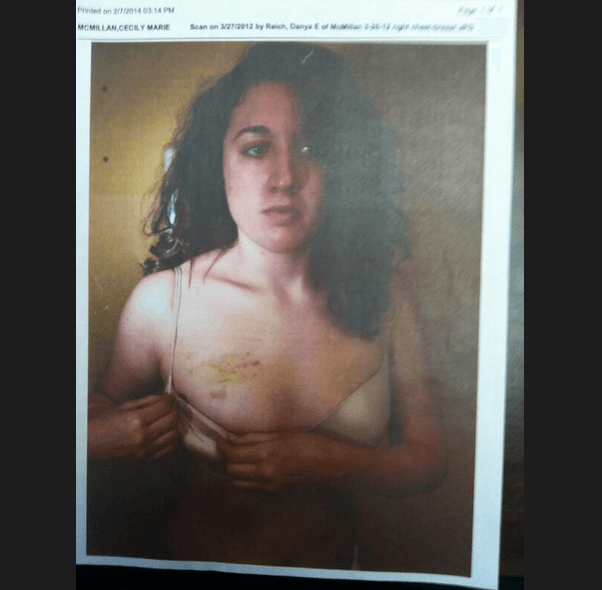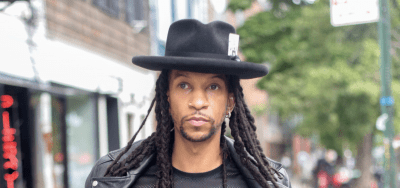Failure of Justice: Occupy Wall Street Protester Cecily McMillan Found Guilty of Assaulting a Police Officer, Faces Seven Years In Jail

Cecily McMillan, following her arrest in March, 2012.
c/o policymic.com
70 Occupy Wall Street activists were arrested late on the night of March 17, 2012 and early in the morning of the 18th, six months after the Occupy movement had begun in Zuccotti Park in downtown Manhattan. One of those activists was 25-year-old grad student Cecily McMillan. But unlike most of the arrests that happened that night and during the two-month period in the autumn of 2011 when Occupy staked out its spot in the public park, McMillan’s did not end in a dismissal, nor was it dropped entirely as were most of the more than 2,500 arrests of Occupy protesters. Instead, McMillan’s case was prosecuted with the full weight of the law, and she now faces up to 7 years in jail for an action that she says—and many witnesses corroborate—was done in self defense. Reports from the courtroom tell of people chanting “Shame! Shame! Shame!” following the verdict, but shame is not just something the judge and prosecutor and jury and everyone involved with the trial should feel. It’s something we should all feel. This is our system and this system is corrupt.
The details of the case are relatively clear. Just after midnight on March 18th, police moved in on the crowds of people assembled at Zuccotti Park in an attempt to disband the memorial protest. McMillan says that Officer Grantley Bovell forcefully grabbed her breast from behind, causing her arm to fly out and her elbow to catch him in the eye. Subsequently, McMillan was handcuffed before collapsing on the ground in an epileptic seizure, while cops stood around her, doing nothing but waiting for over 15 minutes before putting her in an ambulance. There are videos of much of this (although the video of the inciting incident lacks real clarity), and photographs (including the one above) showing the bodily damage inflicted upon McMillan that night. But despite McMillan’s claims and the physical evidence that she was treated as forcefully as she claims, Bovell contended that he never grabbed her, and instead remembers McMillan “crouching down and lunging with her elbow and hitting me in the face.” However, Bovell—who has a history of allegations of excessive force with suspects, as well as a ticket-fixing scandal in his past—couldn’t even consistently remember which eye was the one McMillan struck. But prosecutor Erin Choi was tireless in her tirade against the activist, going so far as to call McMillan’s claims “so utterly ridiculous and unbelievable that she might as well have said that aliens came down that night and assaulted her.” And the jury—hand-selected so as not to contain anyone with any predisposed inclination in favor of OWS—believed Choi.
The conclusion of this case is indicative of many systemic problems, but perhaps none so much as the following two. First, the difficulties that women have bringing claims of sexual assault against their assailants are often overwhelming, and discourage victims from even trying to seek justice. Even when there is photographic evidence and dozens of witnesses at the scene of the assault, as was the case with McMillan, the claims go ignored. And the second is the overwhelming power of the justice system and the work those involved with it do to maintain their hold on that power, even when it means crushing an innocent life. Despite being alleged of behaving in criminal manner himself, Officer Grantley Bovell is a part of this justice system, and as such, it is his integrity that is protected at the expense of someone like Cecily McMillan. McMillan’s only weapon that night—or means of protection—was her flailing elbow, but the hundreds of officers on the scene had guns, batons, and helmets for protection. And yet it is the police that are the victims? Occupy Wall Street was a notoriously non-violent movement, and yet the protestors were frequently met with violence from the police. A woman with a clean record and a promising future just had her life ruined, and an officer with a shady past and a weak grasp of the events of the night in question is praised for doing his job. The failure here is not that our justice system was perverted in this instance; it’s not that McMillan was given an unfair trial. The failure is that McMillan was given the exact kind of trial that our system is set up for, one that supports the police no matter how wrong their behavior, one that dismisses victims of sexual assault in astonishing numbers. In a sense, the system didn’t fail, it worked exactly like it’s supposed to. But in that sad truth lives the real failure.
Follow Kristin Iversen on twitter @kmiversen
You might also like 



















